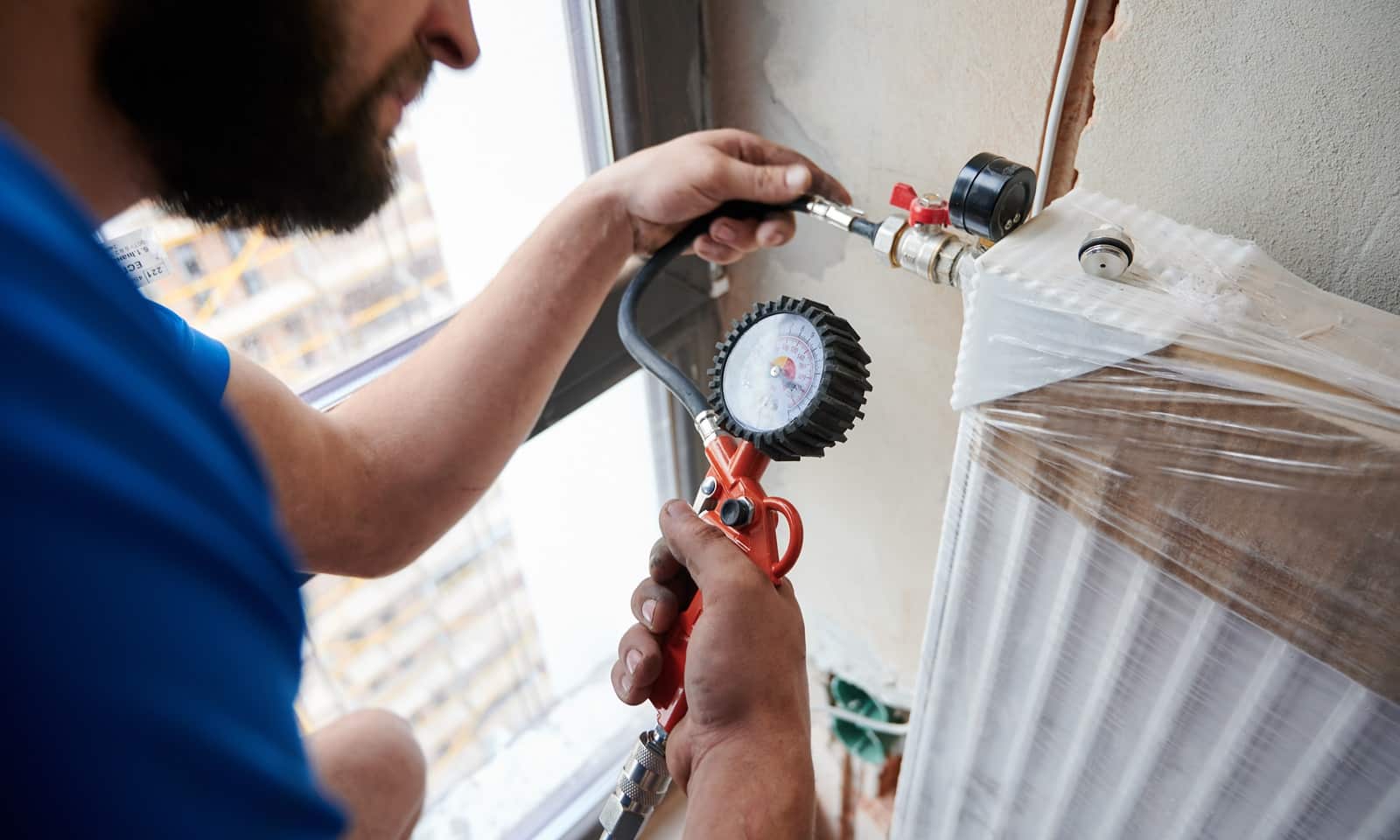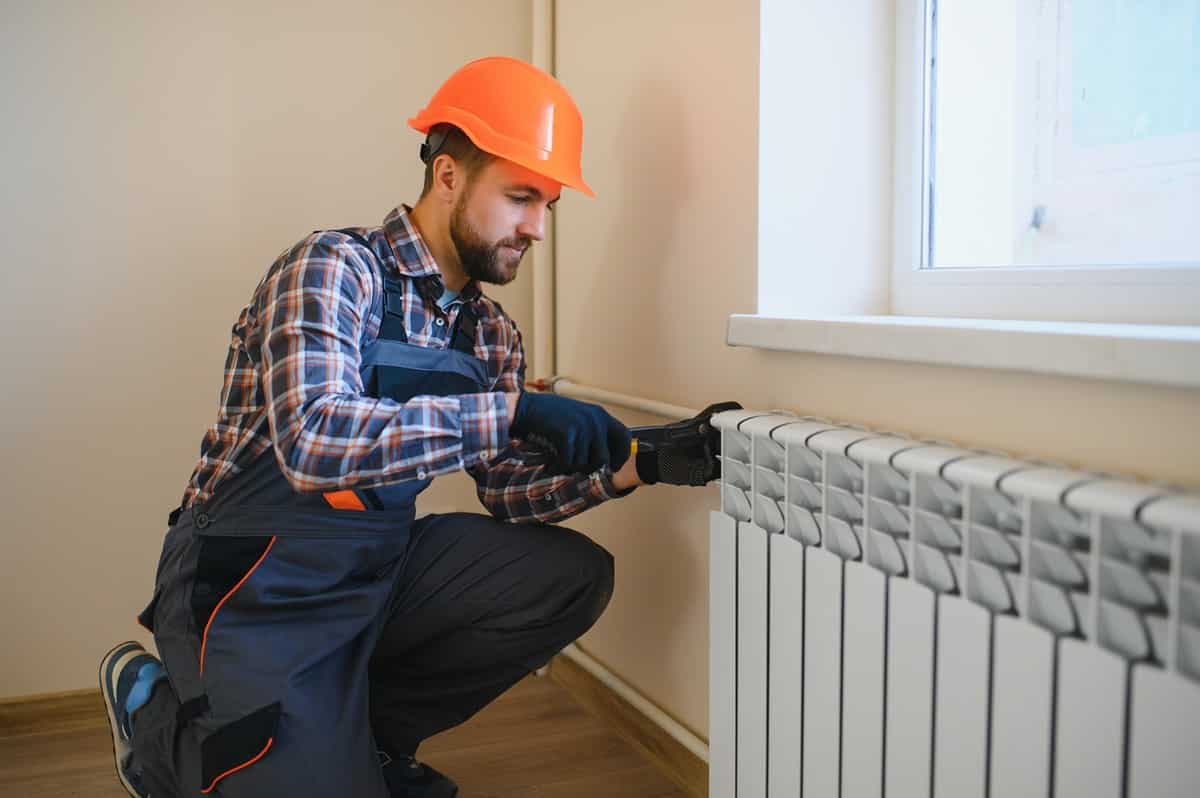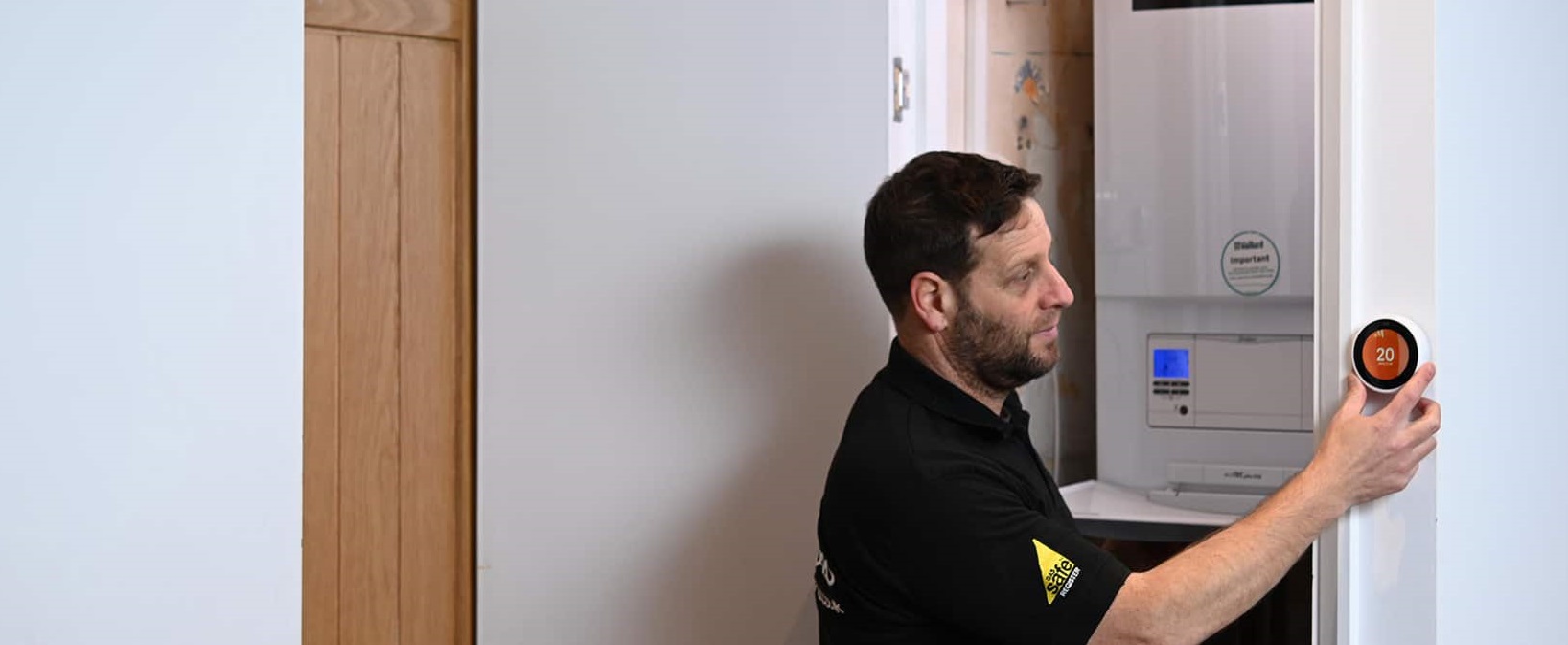 Efficient Heating: How to Reduce Boiler Pressure Safely
Efficient Heating: How to Reduce Boiler Pressure Safely
Ever stared at a boiler pressure gauge, feeling the rising tide of panic as you notice it’s alarmingly high? It’s like watching a horror movie, but this is real life. You’re probably thinking: “how to reduce boiler pressure?” – an essential skill that can feel daunting for many.
We get it; we’ve been there too. That gnawing fear in your stomach isn’t because of any potential danger – modern boilers have safety measures built-in. But seeing those digits climb into the red zone is unnerving nonetheless and may lead to inefficient heating or hot water supply.
So, you’re about to uncover some practical steps that can help tame your system without the need for deep technical know-how. This includes understanding when high pressures pose a threat, pinpointing potential causes and, importantly, recognising how routine maintenance can act as a preventative measure.
Table of Contents:
- Understanding Boiler Pressure
- The Dangers of High Boiler Pressure
- Causes and Prevention of High Boiler Pressure
- Maintenance: A Stitch In Time Saves Nine…
- Steps to Reduce Boiler Pressure
- Dealing with Persistent High Pressures
- Important Links:
- The Role of a Qualified Engineer in Pressure Management
- Low Boiler Pressure Issues
- Maintaining Optimal Boiler Pressure
- FAQs in Relation to How to Reduce Boiler Pressure
- Conclusion
Understanding Boiler Pressure
Your boiler’s like a strong tea kettle, it needs the right pressure to brew perfectly.
The boiler pressure is simply the balance of water and air inside. Think of it as your car tyre’s PSI but for hot water.
A bit techy?
Boiler Pressure Basics: The Gauge and Ideal Range
The secret lies in the pressure gauge.
This nifty dial tells you if things are hunky-dory or heading south. Your combi boiler operates between 1 and 1.5 bars maximum when running hot water or heating.
When Not Running Hot Water Or Heating…
You’re looking at about 1 bar – just enough to keep things ticking over nicely without straining any parts.
Moving into Dangerous Territory with High Boiler Pressure?
“Pressure rising beyond limits.” sounds like something out of a space movie, doesn’t it? But high pressures can indeed push your system into an alarming error zone.
Is high boiler pressure dangerous then? Well, that depends on how high we’re talking.
High enough (over 2 bars) could cause damage. Imagine trying to fill up a pint glass that’s already full – not good news.
What should one do if the boiler’s pressure is too elevated? – you ask?
Well, ‘reduce’ is the keyword. Let’s get into how you can do that.
Reducing Boiler Pressure: A DIY Job?
Reduce boiler pressure, they say, but it’s not as simple as letting out a bit of air from an over-inflated tyre.
Your boiler’s pressure gauge will help guide your efforts. If it starts pointing towards the red zone – danger. You’ve got high pressure on your hands.
Filling Loop Fiasco or Radiator Rescue?
The culprit could be anything from a left-open filling loop to faulty expansion vessels.
But don’t let fear hold you back.
Key Takeaway:
zone, take immediate action. Regularly keep an eye on the pressure gauge and make sure it doesn’t exceed safe levels. If you see it heading towards a dangerous zone, don’t wait – act fast. It’s like keeping your pint glass from overflowing; no one wants to deal with that kind of mess.
The Dangers of High Boiler Pressure
Ever seen a boiler’s pressure gauge needle pointing into the red zone? That’s alarming. High boiler pressure, if unchecked, can lead to issues.
Identifying Signs of High Boiler Pressure
A faulty gauge might trick you into thinking all is well with your central heating system.
If it reads higher than 1.5 bars when off and shoots over 2 bars while running, that’s a sign.
Also look out for leakage from the central heating system – another telltale symptom.
Bear in mind: high pressure isn’t usually dangerous as long as your system has a working relief valve. It steps up to save the day by releasing excess heated water thus preventing sudden increases in pressure. Pressure relief valves, they’re heroes we need but don’t often appreciate enough.
Your Central Heating System Needs Care Too.
Servicing:
- You wouldn’t drive your car without regular servicing, right?
- Treat your combi boiler similarly – get it serviced regularly to prevent high pressures from creeping up on you unawares.
Faulty Expansion Vessel: Overfilled systems or faulty expansion vessels are common causes for increased pressures. Get them checked. They’re like ticking time bombs waiting to explode.
Closed Filling Loop: An open filling loop is a no-no. It can cause your boiler’s pressure to rise too high. Make sure it’s closed tightly after use. Here’s how.
In Case of Persistent High Pressures
If the issue continues, it may be time to seek expert help.
- It might be time for professional intervention – get a gas safe engineer involved.
Find one near you here. Remember, it’s better to
Causes and Prevention of High Boiler Pressure
High boiler pressure can make you feel like a kettle ready to whistle. But don’t fret, let’s tackle this together.
Filling Loop: The Water Overdose Culprit
The filling loop is like your central heating system’s water tap. If left open, it overfills the system causing high pressures.
Think about when you fill a water balloon too much. It becomes tight and ready to burst. Your boiler’s pressure gauge, however, won’t explode but it will start leaking or stop working efficiently.
Faulty Expansion Vessel: The Silent Threat
A faulty expansion vessel behaves just like an exhausted marathon runner who needs more room for heavy breathing after a long run.
If not functioning properly, heated water doesn’t have enough space to expand leading to higher pressure readings on your boiler’s gauge close at hand – no good.
Bleeding Radiators: Letting Off Steam…Literally.
To fix these issues yourself (if you’re up for some DIY), bleeding radiators could be helpful as they release excess air trapped in the heating systems reducing the overall system pressure.
Maintenance: A Stitch In Time Saves Nine…
Just as we go for regular health check-ups, regular servicing of boilers can prevent these alarming errors from occurring.
Remember that ‘Prevention is better than cure’. By regularly checking your boiler and keeping an eye out for tell-tale signs, you can prevent high boiler pressure. Be sure to call a Gas Safe engineer if the problem persists.
Pressure Valves: Your Boiler’s Lifesavers
Finally, make friends with your relief and release valves. They are like pressure cooker whistles preventing sudden steam explosions by maintaining consistent pressures in your central heating systems.
Remember, these steps not only keep your combi boiler working at its best but also ensure safety of all occupants.
Don’t let high pressure turn into an alarming error on that digital display – act now.
Key Takeaway:
High boiler pressure is like an overfilled water balloon, often due to an open filling loop or a faulty expansion vessel. Reducing this can be done by bleeding radiators and regular maintenance – it’s akin to giving your heating system consistent health check-ups. Relief and release valves are crucial too; they play a key role in maintaining steady pressures. Let’s not forget about safety – it should always come first.
Steps to Reduce Boiler Pressure
The pressure’s up. Your boiler’s sweating more than a long-tailed cat in a room full of rocking chairs.
But, don’t fret. There are steps you can take to bring that bad boy back down to earth.
Check the Pressure Gauge
Your first port of call? The pressure gauge.
If it’s pointing towards the red zone on your combi boiler or central heating system, Houston we have a problem.
Bleed Radiators
A common fix is bleeding radiators. Grab your radiator key and drain cock (mind out for hot water.). Begin at the base, advance upwards.
Closing Filling Loop or Relief Valve
Sometimes these things get left open. Check them – closed tightly?
Dealing with Persistent High Pressures
If you’ve tried everything but pressures still high like Mount Everest, might be time for some detective work…
- Faulty expansion vessel giving you grief?
- Filling loop resembling Niagara Falls when it should be as dry as Death Valley?
If so, reach out for help from our mates at Plumbers 4U.
Important Links:
How to reduce your boiler pressure in 6 steps
Professional Help
If all else fails, it’s time to call in the big guns – a gas-safe engineer.
mbers 4uplumbers are just a phone call away.
So, there you have it. Steps to reduce boiler pressure that’ll keep your system working efficiently and prevent high pressures from turning into alarming errors on your digital display.
The Role of a Qualified Engineer in Pressure Management
So, you’ve done your best to reduce that pesky boiler pressure.
You checked the gauge and bled radiators like a pro. But it’s still high.
Time to call in some professional help.
Your Lifeline: The Gas Safe Engineer
A Gas Safe engineer is who you need when things get tough.
They’re not just experts at reading complex digital displays or knowing what makes your boiler tick – they live for this stuff.
The Expert Touch on Persistent High Pressures
Sometimes, despite all efforts, that needle keeps pointing into the red zone.
This could be due to an issue with expansion vessels or filling loops.
Faulty Expansion Vessel? Not A Problem.
If there’s one thing engineers love more than their tools – it’s fixing faulty equipment.
Persistent high pressures? It might be because of a faulty expansion vessel causing higher pressure inside your central heating systems.
Your gas safe engineer knows exactly what to do if this is the case.
Filling Loop Left Open? Easy Peasy.
Filling loop left open after topping up water?
This can cause high pressures too.
A good rule of thumb from our experienced engineers – always ensure filling loops are closed tightly after use.
Preventing Future High Pressures
Once they’ve fixed your immediate boiler issue, these engineers will give you advice on preventing high pressures in the future.
This might involve regular servicing to keep everything working smoothly or replacing faulty pressure relief valves.
Avoid Boiler Nightmares With Regular Servicing
Your heating work isn’t done just because the engineer has left.
To prevent sudden jumps in the boiler’s pressure gauge readings and ensure efficient functioning of your central heating boiler, make sure it’s serviced regularly.
So, what should you remember? Don’t feel defeated when dealing with persistently high pressures.
Key Takeaway:
Reducing boiler pressure can be tricky. If efforts like bleeding radiators fail, it’s time to call a Gas Safe engineer. They’ll identify the cause, such as a faulty expansion vessel or open filling loop and fix it efficiently. But remember – regular servicing is key to prevent future high pressures and ensure efficient heating.
Low Boiler Pressure Issues
When it comes to boiler troubles, low pressure is a frequent culprit. It’s like the silent movie of central heating nightmares – no bangs or explosions, just a creeping chill and an icy shower.
No heat? No hot water? Your boiler might be suffering from low pressure.
The Hidden Leaks and Sneaky Seeps
A sneaky leak in your central heating system could cause your boiler’s pressure gauge to drop. Like trying to drink through a straw with holes in it, these leaks prevent efficient circulation.
If you’ve got carpets soaking up the evidence or pipes hidden behind walls, tracking down these drips can be tough work.
Bleeding Radiators: A Double-Edged Sword?
You know how we’re always saying ‘bleed your radiators’? Well sometimes that’s part of the problem. Bleeding radiators lets out air which can lead to less water circulating around – leading again to lower pressures on our old friend, the boiler gauge.
Faulty Parts Could Be The Culprit
Sometimes faulty parts are at play here too. Your release valve may not have closed properly after letting off steam (literally).
Repressurising your boiler could help sort this issue out but if you’re still stuck with stubbornly low readings despite doing everything right – then I hate breaking bad news but…you might need professional help.
Maintaining Optimal Boiler Pressure
Keep your boiler’s pressure gauge in check. It should usually be between 1 and 1.3 bar.
Not running hot water or heating? Your pressure should be around 1 bar then.
Turned on the heating? Expect it to hit between 1.5 and 2 bars, tops.
Bleeding Radiators – The First Step
No one wants a high-pressure boiler scenario, right?
Bleed radiators. Use that trusty radiator key.
Closing Filling Loops and Relief Valves
Filling loop left open? Close it. Same goes for the relief valve if it’s not tightly shut.
Persistent High Pressures?
Here comes the tricky bit.
Persistent high pressures can indicate a faulty expansion vessel or filling loop.
Got an alarming error on your digital display?
That needle pointing into the red zone isn’t good news.
If you’re losing sleep over this central heating system’s issue, ask for help.
Don’t hesitate to call up a gas safe engineer from Ideal Heating.
They’ll sort out any faulty pressure valves or issues with heated water.
Remember, safety first.
low boiler pressures are equally bothersome.
It might mean no heating or hot water – brrr.
Worse still, potential leaks in your central heating systems could occur.
But don’t worry – there’s always help at hand.
The chaps at Ideal Heating have got some nifty advice on how to repressurise low boilers here.
So, there you have it.
Maintaining optimal boiler pressure isn’t rocket science.
But when in doubt, get professional help.
It’s all about ensuring that you keep your…
FAQs in Relation to How to Reduce Boiler Pressure
What happens if boiler pressure is too high?
If your boiler’s pressure is too high, it can lead to leaks and potentially damage the system. It could also trigger a safety valve that releases excess water.
Will boiler pressure drop on its own?
No, generally boiler pressure won’t drop by itself. You’ll likely need to bleed radiators or drain some water from the system to reduce it.
Does bleeding radiators reduce boiler pressure?
Absolutely. Bleeding Your Radiators can help bring down an over-pressurised heating system by releasing trapped air pockets inside them.
How do I reduce the flow of my boiler?
To lessen your boiler’s flow rate, you’d adjust valves at taps or showers – not on the actual unit. Remember: less flow equals slower heat up times for hot water outlets.
Conclusion
Boiler pressure got you in a sweat? Now, it’s clear. Understanding the how to reduce boiler pressure, why it rises and when to take action is within your grasp.
You’ve learnt about high pressures – what they mean, how they impact heating systems and their potential causes like an overfilled filling loop or faulty expansion vessel. But remember: these aren’t always alarming errors!
We’ve highlighted the importance of regular servicing – that key preventive measure for maintaining optimal boiler pressures. It’s all making sense now.
If trouble persists despite efforts to bleed radiators or check valves, then bring in a gas safe engineer for help! And let’s not forget low-pressure issues too; be ready with solutions at hand.
Managing your central heating doesn’t have to feel daunting anymore because you’re equipped with knowledge and confidence now!



